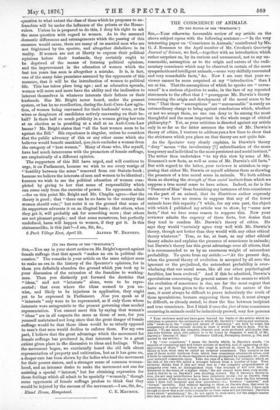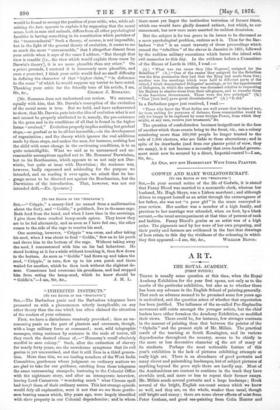THE CONSCIENCE OF ANIMALS.
[TO THE EDITOR OF THE "SPECTATOR.")
SIR,—Your otherwise favourable review of my article on the above subject opens with the following sentence In the very interesting paper on Conscience in Animals,' contributed by Mr. G. J. Romanes to the April number of Mr. Crookes's Quarterly Journal of Science, we find,—together with an introduction which rather surprises us, by its curious and unreasoned, not to say un- reasonable, assumption as to the origin and nature of the rudi- mentary conscience which may be observed in certain of the more sympathetic and intelligent animals, —some very skilfully recounted and very remarkable facts," &c. Now I am sure that your re- viewer cannot be more surprised at my "introduction" than I am at his. That the assumptions of which he speaks are " unrea- soned" is a curious objection to make, in the face of my repeated statements to the effect that I " presuppose Mr. Darwin's theory concerning the origin and development of the moral sense to be true." That these " assumptions " are " unreasonable" is surely an extraordinary charge to bring against conclusions which, whether or not we accept them, no one can deny to be among the most thoughtful and the most important in the whole range of ethical philosophy.* Yet, as your criticism is directed against my article only in so far as the latter assumes the truth of Mr. Darwin's theory of ethics, I venture to address you a few lines to show that the strictures which you place on that theory are not quite fair.
As the Spectator very clearly explains, in Darwin's theory " duty " means "the involuntary [?] subordination of the more temporary and individual to the more persistent and social instinct." The writer then undertakes "to try this view by some of Mr. Romanes's new facts, as well as some of Mr. Darwin's old facts." But with regard to the latter, your reviewer is mistaken in sup- posing that either Mr. Darwin or myself adduces them as showing the presence of a true moral sense in animals. We both adduce them as showing the strength of those social instincts from which we suppose a true moral sense to have arisen. Indeed, so far is the "Descent of Man" from furnishing any instances of true conscience on the part of an animal, that its illustrious author expressly states " we have no reason to suppose that any of the lower animals have this capacity ;"t while, for my own part, the object with which I published my article was to show, by "some new facts," that we have some reason to suppose this. Now your reviewer admits the cogency of these facts, but denies that they tend to confirm Mr. Darwin's theory of ethics. He says they would "certainly agree very well with Mr. Darwin's theory, though not better than they would with any other ethical theory whatever." True, so far, at least, as any other ethical theory admits and explains the presence of conscience in animals; but Darwin's theory has this great advantage over all others, that it is recommended to us by an enormous weight of antecedent probability. To quote from my article :—"At the present day, when the general theory of evolution is accepted by all save the ignorant or the prejudiced, the antecedent probability is over- whelming that our moral sense, like all our other psychological faculties, has been evolved." And if this be admitted, Darwin's speculations concerning the general nature of the causes to which the evolution of conscience is due, are far the most cogent that have as yet been given to the world. From the nature of the case, it must always be difficult to prove inductively the truth of these speculations, because supposing them true, it must always be difficult, as already stated, to draw the line between incipient and true conscience. But I think if once the fact of true conscience occurring in animals could be inductively proved, very few persons • Your reviewer need not have gone beyond the limits of the article which he criticises to perceive the estimation in which Mr. Darwin's "curious and unreason- able " views as to the " origin and nature of conscience " are held by some, the competency of whose rational faculty at least it would be idle to deny. For in- stance, "To my mind, the simplest, clearest, and most profound philosophy that was ever written upon this subject is to be found In chapters II. and ill. of Mr. Darwin's Descent of Man."' (Professor Clifford, Fortnightly Review, p. 794, and quoted In my article.) t By "true conscience," I mean the faculty which, in Darwin's words, "is capable of comparing past and future actions or motives, and of approving or dis- approving of them." But before this stage is arrived at, there is, if Darwin's theory is true, what may be called an incipient conscience. This consists in the sum of those social instincts from which true conscience afterwards arises, and it finds its expression in those impulsive actions, prompted by sympathy, tee , which your reviewer comments upon. Take the case of a baboon, for instance, which, at the risk of his own life, saved a younger baboon from a number of doge. Your reviewer thinks that if this act were due to "the complete preponderance of sympathy over fear, as distinguished from "the triumph of will over fear, in deference to the sense of a higher claim," the act cannot have been truly moral. And in this he is, on Darwin's own showing, correct. But if Darwin's theory is true, the act may nevertheless have been incipiently moral ; for as Darwin vary clearly shows, If his theory is true, it must be impossible to draw the line between what I here call incipient and true conscience,—i.e., between " material " and " formal " morality. And without waiting to show, as Darwin does, that even in ourselves, as a matter of lad, it is not possible to draw any such line, I have said enough to show that your critic's remarks on these cases are not relevant. Darwin's views about " persistency," Ac., do not apply to such cases, for the simple reason. that they are not cases of truly conscientious action.
would be found to occupy the position of your critic, who, while ad- mitting the fact, appears to explain it by supposing that the moral sense, both in man and animals, differs from all other psychological faculties in having something in its constitution which partakes of the "transcendental." Such a theory, of course, is not impossible, but in the light of the general theory of evolution, it seems to me so much the more " unreasonable," that I altogether dissent from your article when it says of the cases I adduce, "But though that view is tenable [i.e., the view which would explain those cases by Darwin's theory], it is no more plausible than any other." On a priori grounds, I contend it is immensely more plausible, and even a posteriori, I think your critic would find no small difficulty in defining the character of that "higher claim," "in deference to the sense "of which he would suppose my terrier to have acted. Thanking your critic for the friendly tone of his article, I am, [Mr. Romanes does not understand our review. We assumed, equally with him, that Mr. Darwin's conception of the evolution of the moral sense is true. But we hold, and have endeavoured to show, that Mr. Darwin puts into the idea of evolution what is not and cannot be properly attributed to it, namely, the pre-existence in the germ and in its conditions of all that is found in the higher forms " evolved." Evolution properly implies nothing but gradual steps,—so gradual as to be all but insensible,—in the development of organisation ; and the theory which ignores the real additions made by these steps, and makes the man, for instance, nothing but the child with some change in the environing conditions, is to us quite unintelligible. What we said as to unreasoned and un- reasonable assumptions applied not to Mr. Romanes' Darwinism, but to his Benthamism, which appears to us not only not Dar- winite, but quite at issue with Darwinism ; the sentence was, however, badly expressed and misleading for the purpose we intended, and on reading it over again, we admit that its lan- guage seems to be directed not against the Benthamism, but the Darwinism of the introduction. That, however, was not our intended drift.—ED. Spectator.]



































 Previous page
Previous page